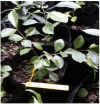How the Custom Suppresses the Endowment Effect: Exchange Paradigm in Kanak Country
- PMID: 35145459
- PMCID: PMC8822236
- DOI: 10.3389/fpsyg.2021.785721
How the Custom Suppresses the Endowment Effect: Exchange Paradigm in Kanak Country
Abstract
In this paper, Knetsch's exchange paradigm is analyzed from the perspective of pragmatics and social norms. In this paradigm the participant, at the beginning of the experiment, receives an object from the experimenter and at the end, the same experimenter offers to exchange the received object for an equivalent object. The observed refusal to exchange is called the endowment effect. We argue that this effect comes from an implicature made by the participant about the experimenter's own expectations. The participant perceives the received item as a gift, or as a present, from the experimenter that cannot be exchanged as stipulated by the social norms of western politeness common to both the experimenter and the participant. This implicature, however, should not be produced by participants from Kanak culture for whom the perceived gift of a good will be interpreted as a first act of exchange based on gift and counter-gift. This exchange is a natural, frequent, balanced, and indispensable act for all Kanak social bonds whether private or public. Kanak people also know the French social norms that they apply in their interactions with French people living in New Caledonia. In our experiment, we show that when the exchange paradigm takes place in a French context, with a French experimenter and in French, the Kanak participant is subject to the endowment effect in the same way as a French participant. On the other hand, when the paradigm is carried out in a Kanak context, with a Kanak experimenter and in the vernacular language, or in a Kanak context that approaches the ceremonial of the custom, the endowment effect is no longer observed. The same number of Kanak participants accept or refuse to exchange the endowed item. These results, in addition to providing a new explanation for the endowment effect, highlight the great flexibility of decisions according to social-cultural context.
Keywords: Kanak culture; custom; decision-making; endowment effect; exchange paradigm; human interaction; politeness social norms; pragmatics.
Copyright © 2022 Baratgin, Godin and Jamet.
Conflict of interest statement
The authors declare that the research was conducted in the absence of any commercial or financial relationships that could be construed as a potential conflict of interest.
Figures
Similar articles
-
Childhood sexual abuse and adult sexual health among indigenous Kanak women and non-Kanak women of New Caledonia.Child Abuse Negl. 2010 Sep;34(9):677-88. doi: 10.1016/j.chiabu.2010.02.004. Child Abuse Negl. 2010. PMID: 20663555
-
Body-as-Subject in the Four-Hand Illusion.Front Psychol. 2018 Sep 19;9:1710. doi: 10.3389/fpsyg.2018.01710. eCollection 2018. Front Psychol. 2018. PMID: 30283376 Free PMC article.
-
The WHO/START study in New Caledonia: A psychological autopsy case series.J Affect Disord. 2020 Feb 1;262:366-372. doi: 10.1016/j.jad.2019.11.020. Epub 2019 Nov 9. J Affect Disord. 2020. PMID: 31740112
-
Altruism, gift giving and reciprocity in organ donation: a review of cultural perspectives and challenges of the concepts.Transplant Rev (Orlando). 2014 Oct;28(4):163-8. doi: 10.1016/j.trre.2014.05.001. Epub 2014 May 27. Transplant Rev (Orlando). 2014. PMID: 24973193 Review.
-
Risk management frameworks for human health and environmental risks.J Toxicol Environ Health B Crit Rev. 2003 Nov-Dec;6(6):569-720. doi: 10.1080/10937400390208608. J Toxicol Environ Health B Crit Rev. 2003. PMID: 14698953 Review.
References
-
- Apicella C. L., Azevedo E. M., Christakis N. A., Fowler J. H. (2014). Evolutionary origins of the endowment effect: evidence from hunter-gatherers. Am. Econ. Rev. 104, 1793–1805. 10.1257/aer.104.6.1793 - DOI
-
- Axia G., Baroni M. R. (1985). Linguistic politeness at different age levels. Child Dev. 56, 918–927. 10.2307/1130104 - DOI
-
- Bagassi M., Macchi L. (2006). Pragmatic approach to decision making under uncertainty: the case of the disjunction effect. Think. Reason. 12, 329–350. 10.1080/13546780500375663 - DOI
-
- Bagassi M., Salerni N., Castoldi V., Sala V., Caravona L., Poli F., et al. . (2020). Improving children's logical and mathematical performance via a pragmatic approach. Front. Educ. 5:54. 10.3389/feduc.2020.00054 - DOI
-
- Baratgin J. (2002). Is the human mind definitely not Bayesian? A review of the various arguments. Curr. Psychol. Cogn. 21, 653–680.
LinkOut - more resources
Full Text Sources





